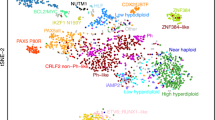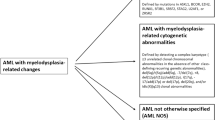Summary
Only few human meningiomas show a normal karyotype whereas in most of them a G-Chromosome loss is the primary cytogenetic event, often followed by the loss of further, mostly acrocentric, chromosomes. As the karyotype of each meningioma is normally uniform, these tumors seemed to us expecially suitable to investigate which chromosomes are involved in nucleolar organisation. We compared the number of nucleoli in cells of meningioma cultures which have lost none, one, two or more acrocentric chromosomes. Between tumours with normal karyotype and those showing a G monosomy only a slight difference was found. However there was a highly significant decrease in the nucleolar count after the loss of two or more acrocentric chromosomes (p<0.0l). The loss of non-acrocentric chromosomes did not influence the number of nucleoli. Furthermore we observed that meningioma cells being cultured only for 2–3 days, contained less nucleoli than cells of cultures from the 7th to 9th day (p<0.01). Already in this early stage of proliferation a strongly diminished number of nucleoli appeared in tumours having lost more than one acrocentric chromosome. These results prove acrocentric chromosomes play the most important role in nucleolar organisation.
Zusammenfassung
Nur wenige menschliche Meningeome zeigen einen normalen Chromosomensatz, während bei den meisten der Verlust eines G-Chromosoms zu beobachten ist, auf den oft der Verlust weiterer, meist akrozentrischer, Chromosomen folgt. Da der Chromosomensatz in den einzelnen Meningeomen meist einheitlich ist, erscheinen diese Tumoren besonders für die Untersuchung geeignet, welche Chromosomen an der Nucleolusorganisation beteiligt sind. Zu diesem Zweck verglichen wir die Nucleolenzahlen in Meningeomkulturen die kein, ein, zwei oder mehr akrozentrische Chromosomen verloren hatten. Dabei fand sich nur ein geringer Unterschied zwischen Tumoren mit normalem Chromosomensatz und solchen mit einer G-Monosomie. Ein hochsignifikanter Rückgang der Nucleolenzahl war jedoch bei Verlust von 2 oder mehr akrozentrischen Chromosomen zu beobachten (P<0.01). Ein Verlust anderer Chromosomen hatte keinen Einfluß auf die Nucleolenzahl.
Es konnte weiterhin beobachtet werden, daß bei nur 2–3tägiger Züchtungsdauer die Nucleolenzahl in allen untersuchten Meningeomgruppen signifikant niedriger war, als bei einer Kulturdauer von 7–9 Tagen (P<0.01). Bereits in diesem frühen Wachstumsstadium der Meningeomkulturen wurde eine stark verminderte Nucleolenzahl bei den Tumoren festgestellt, die mehrere akrozentrische Chromosomen verloren hatten.
Die Ergebnisse stützen die Annahme, daß die akrozentrischen Chromosomen den entscheidenden Anteil an der Nucleolusorganisation haben.
Similar content being viewed by others
References
Barr, H. J., Esper, H.: Nucleolar size in cells of Xenopus leavis in relation to nucleolar competition. Exp. Cell Res.31, 211 (1963).
Berns, M. W., Ohnuki, Y., Rounds, D. E., Olson, R. S.: Modification of nucleolar expression following laser microirradiation of chromosomes. Exp. Cell Res.60, 133–138 (1970).
Ferguson-Smith, M. A.: The sites of nucleolus formation in human pachytene chromosomes. Cytogenetics3, 124–134 (1964).
Gonzalez, P., Nardone, R. M.: Cyclic nucleolar changes during the cell cycle. I. Variations in number, size, morphology and position. Exp. Cell Res.50, 599–615 (1968).
Heneen, W. K., Nichols, W. W.: Persistence of nucleoli in short term and long term cultures and in direct bone marrow preparations in mammalian materials. J. Cell Biol.31, 543–561 (1966).
Mark, J.: Chromosomal patterns in human meningiomas. Europ. J. Cancer6, 489–498 (1970).
Miller, L., Brown, D. D.: Variation in the activity of nucleolar organizers and their ribosomal gene content. Chromosoma (Berl.)28, 430–444 (1969).
Petersen, G. B., Therkelsen, A. J.: Number of nucleoli in female and male human cells in tissue culture. Exp. Cell Res.28, 590–592 (1962).
Porter, I. H., William, F. B., Brown, C. D., Paul, G.: Recent advances in molecular pathology : Some aspects of chromosome change in cancer. Exp. molec. Path.11, 340–367 (1969).
Singer, H., Zang, K. D.: Cytologische und cytogenetische Untersuchungen an Hirntumoren. I. Die Chromosomenpathologie des menschlichen Meningioms. Humangenetik9, 172–184 (1970).
Therkelsen, A. J.: Frequency of sex chromatin and number of nucleoli in cells grown in tissue cultures from normal human subjects and human subjects with supernumerary X-chromosomes. Acta path. microbiol. scand., Sect. A78, 295–304 (1970).
Yerganian, G.: Cytological maps of some isolated human pachytene chromosomes. Amer. J. Hum. Genet,9, 42–48 (1957).
Yerganian, G.: Chromosome cytology of medical anomalies. In: Radiation induced chromosome aberations; ed.: S. Wolff, p. 259. New York: Columbia University Press 1963
Zang, K. D., Singer, H.: Chromosomal constitution of meningiomas. Nature (Lond.)216, 84–85 (1967).
Author information
Authors and Affiliations
Additional information
This study was supported by the Deutsche Forschungsgemeinschaft (Za 32/9).
We thank Mrs. Jutta Winkler, Miss Helma Büscher and Mr. Werner Kofler for skilful assistance in tissue culture and chromosome preparation.
Rights and permissions
About this article
Cite this article
Zankl, H., Zang, K.D. The role of acrocentric chromosomes in nucleolar organization. Virchows Arch. Abt. B Zellpath. 11, 251–256 (1972). https://doi.org/10.1007/BF02889403
Received:
Issue Date:
DOI: https://doi.org/10.1007/BF02889403




